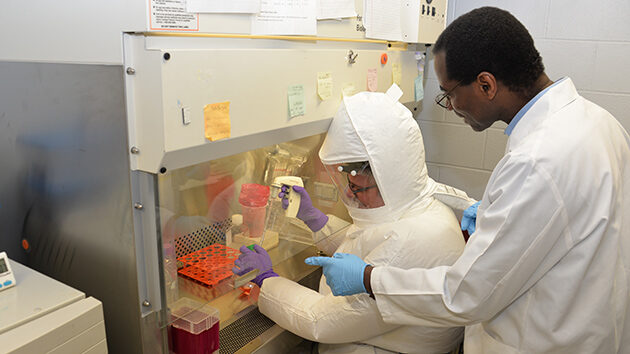Covid-19 Research Thrives at Albany Med

As always, Albany Medical College researchers have taken part in helping to solve the most cutting-edge medical issues of our time. Ongoing Covid-19 research at Albany Med encompasses both basic research and clinic-based studies involving Covid-19 in the lab and Covid-19 patients. In 2020, investigators from the Departments of Medicine, Immunology and Microbial Disease and Molecular and Cellular Physiology submitted applications for Covid-19 research grants, including to the National Institutes of Health, Department of Defense and the American Heart Association. Investigators across the institution studied the effects of various therapies on Covid-19 patients, as well as how the pandemic has impacted the Medical Center as a whole.
“Albany Med investigators have also submitted dozens of research papers and commentaries related to the Covid-19 pandemic to academic journals,” said Paul Feustel, PhD, director of the Office of Research Affairs. “In total, Albany Med has more than 40 ongoing studies related to Covid-19.”
In a major research project, Ariel Jaitovich, MD, pulmonary and critical care physician, partnered with the University of Wisconsin-Madison to study why some patients experienced Covid-19 more severely than others using molecular signatures of the disease. Marc Judson, MD, chief of the Division of Pulmonary and Critical Care Medicine, worked with his research team as part of a national program coordinated by the Mayo Clinic to study convalescent plasma therapy, which was later approved for Covid-19 treatment by the FDA. Other topics have included steroid therapy, the effects of pregnancy on the immune system, clinical management of psoriasis patients during the pandemic, and ventilator triage policies. In the Department of Immunology and Microbial Disease (IMD), investigators are developing new diagnostic approaches and determining the reliability of the current PCR test for detection of active virus.
These studies have gleaned valuable information that, even as vaccination slows and eventually puts an end to the pandemic, will have meaning for possible future disease outbreaks and similar medical crises, as well as treatment of patients with severe respiratory disease and more. For instance, in labs in the IMD, researchers have been looking at ways of regulating cells that could, potentially, help an organism infected with Covid-19 maintain healthy lung tissue.
“Our research will apply to other acute respiratory viral infections and especially new strains of SARS if they appear. Remember this is the second deadly SARS virus we have seen within the past 20 years,” said IMD Director and Professor Dennis Metzger, PhD.